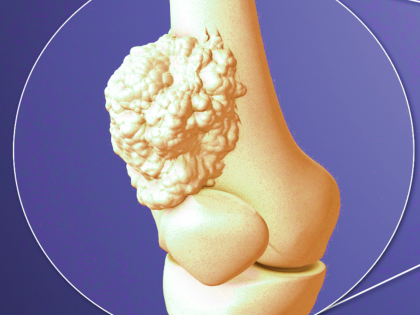Bone Cancer: Want to Protect Your Bone Health? Start by Noticing These Small Clues
By Lokmat Times Desk | Updated: August 5, 2025 11:01 IST2025-08-05T11:00:50+5:302025-08-05T11:01:35+5:30
Just the word "cancer" can strike fear in anyone’s heart. Among its many forms, bone cancer—specifically osteosarcoma—is one of ...

Bone Cancer: Want to Protect Your Bone Health? Start by Noticing These Small Clues
Just the word "cancer" can strike fear in anyone’s heart. Among its many forms, bone cancer—specifically osteosarcoma—is one of the most dangerous. Bones are the structural foundation of our body, making bone health extremely important. However, the early signs of bone cancer are often subtle, leading many to ignore them. This results in a delayed diagnosis and treatment. Symptoms like persistent bone pain, swelling, or even fractures caused by minor injuries are frequently overlooked. But these seemingly small issues may actually be signs of a serious illness. Understanding and recognizing these symptoms early can make a significant difference.
Detecting bone cancer in its early stages significantly improves the chances of successful treatment. Awareness is key. Bone pain is the most common early symptom, especially at night or during movement. Unlike regular aches, this pain doesn’t improve with rest or basic painkillers. Persistent pain in one specific area should never be ignored. As the tumor grows, the discomfort also intensifies. In many cases, swelling or lumps may appear near the affected area. These lumps gradually enlarge and may feel warm or painful to the touch, sometimes even before any pain starts. Monitoring such changes is critical.
As the disease progresses, bones become increasingly fragile, making them prone to breaking even from minor impacts or falls. Frequent, unexplained fractures should raise immediate concern. People suffering from bone cancer often experience extreme fatigue that does not go away with rest. The body, under stress from the growing tumor, also begins to lose weight suddenly. If the tumor is located near a joint, it may cause difficulty in movement, limping, or stiffness. If symptoms like continuous pain, swelling, fractures, or fatigue persist for more than a week or two, medical consultation should not be delayed.
Also Read: Study explores role of brain in treating type 1 diabetes
Diagnosis of bone cancer typically involves imaging tests such as MRI, X-rays, and biopsies to confirm the presence and extent of the tumor. Treatments include chemotherapy, surgery, and radiation therapy, all of which are more effective when started early. Early detection can drastically improve recovery rates and survival chances. Since the signs often appear ordinary, it’s crucial not to dismiss them. Regular checkups and prompt action upon noticing any of the symptoms mentioned can be life-saving. If addressed early, bone cancer can often be managed successfully through a combination of medical treatment and supportive care.
In addition to medical care, certain natural remedies can help maintain bone strength. Include calcium and vitamin D-rich foods like milk, spinach, sesame seeds, butter, and mushrooms in your daily diet. Protein-rich foods like lentils, meat, and cheese are also vital for bone health. Regular exercises such as walking, weight training, and yoga strengthen bones and improve mobility. Traditional home remedies like consuming sesame with jaggery, drinking turmeric milk, or soaking ginger overnight and eating it in the morning may also aid bone health. A nutrient-rich diet, paired with physical activity, is essential to prevent weakness and support long-term wellness.
Open in app